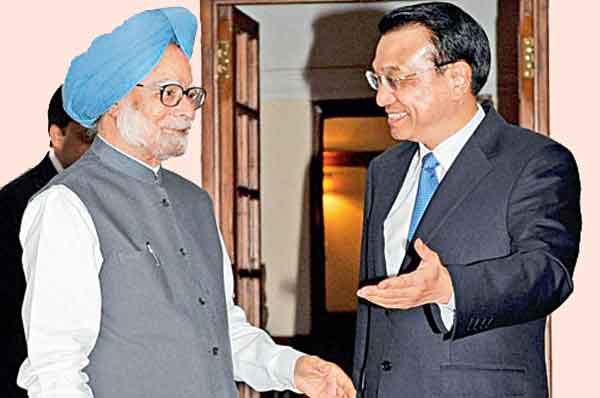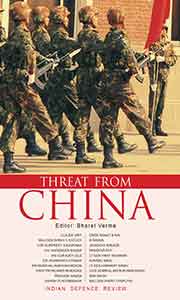The Government of the Republic of India and the Government of the People’s Republic of China (hereinafter referred to as the ‘two sides’),
Firmly believing that the India-China Strategic and Cooperative Partnership for Peace and Prosperity serves the fundamental interests of the people of the two countries,
The two sides agree that they shall not follow or tail patrols of the other side in areas where there is no common understanding of the line of actual control in the India-China border areas.
Reiterating that neither side shall use its military capability against the other side and that their respective military strengths shall not be used to attack the other side,
Reaffirming that neither side shall use or threaten to use force against the other side by any means nor seek unilateral superiority,
Having accepted the principle of mutual and equal security,
Acknowledging the need to continue to maintain peace, stability and tranquility along the line of actual control in the India-China border areas and to continue implementing confidence building measures in the military field along the line of actual control,
Recognizing the importance of materializing the spirit of the Agreement between the Government of the Republic of India and Government of the People’s Republic of China on the Maintenance of Peace and Tranquility Along the Line of Actual Control in the India-China Border Areassigned on 7th September 1993, the Agreement between the Government of the Republic of India and the Government of the People’s Republic of China on Confidence Building Measures in the Military Field Along the Line of Actual Control in the India-China Border Areassigned on 29th November 1996, the Protocol between the Government of the Republic of India and the Government of the People’s Republic of China on Modalities for the Implementation of Confidence Building Measures in the Military Field Along the Line of Actual Control in India-China Border Areassigned on 11th April 2005 and the Agreement between the Government of the Republic of India and the Government of the People’s Republic of China on the Establishment of a Working Mechanism for Consultation and Coordination on India-China Border Affairssigned on 17th January 2012,
Have agreed as follows:
Article I
The two sides shall carry out border defence cooperation on the basis of their respective laws and relevant bilateral agreements.
Article II
The two sides shall implement border defence cooperation in the following ways:
In case a doubtful situation arises with reference to any activity by either side in border areas where there is no common understanding of the line of actual control, either side has the right to seek a clarification from the other side.
- Exchange information-including information about military exercises, aircrafts, demolition operations and unmarked mines-and take consequent measures conducive to the maintenance of peace, stability and tranquility along the line of actual control in the India-China border areas,
- Jointly combat smuggling of arms, wildlife, wildlife articles and other contrabands,
- Assist the other side in locating personnel, livestock, means of transport and aerial vehicles that may have crossed or are possibly in the process of crossing the line of actual control in the India-China border areas,
- Work with the other side in combating natural disasters or infectious diseases that may affect or spread to the other side,
- Any other way mutually agreed upon by the two sides.
Article III
Border deference cooperation visualized in this agreement shall be implemented through the following mechanisms:
- Flag meetings or border personnel meetings at designated places along the line of actual control in the India-China border areas.
- Periodic meetings between officers of the relevant Military Regions of China and Army Commands of India and between departments responsible for military operations.
- Periodic meetings of the representatives of the Ministry of Defence of the Government of India and the Ministry of National Defence of the People’s Republic of China.
- Meetings of the Working Mechanism for Consultation and Coordination on India-China Border Affairs.
- Meetings of the India-China Annual Defence Dialogue.
Article IV
In implementing border defence cooperation and to facilitate contacts and meetings between relevant organizations, the two sides may establish Border Personnel Meeting sites in all sectors, as well as telephone contacts and telecommunication links at mutually agreed locations along the line of actual control. The two sides may also consider establishing a Hotline between the military headquarters of the two countries. Specific arrangements shall be decided upon through mutual consultations between the two sides.
Article V
In order to enhance understanding and cooperation between the border defence forces of the two sides, each side may invite the other side for joint celebrations on major national or military days or festivals and organize cultural activities, non-contact sports events and small scale tactical exercises along the line of actual control in the India-China border areas. In addition, the two sides may also conduct joint military training exercises, at Army level, in each other’s country on a regular basis. The theme of such joint exercises will be decided through mutual consultations.
The two sides shall implement this Agreement without prejudice to their respective positions on the alignment of the line of actual control as well as on the boundary question.
Article VI
The two sides agree that they shall not follow or tail patrols of the other side in areas where there is no common understanding of the line of actual control in the India-China border areas.
Article VII
In case a doubtful situation arises with reference to any activity by either side in border areas where there is no common understanding of the line of actual control, either side has the right to seek a clarification from the other side. In such cases, the clarification shall be sought and replies to them shall be conveyed through any of the mechanisms established under Article III of this Agreement.
Article VIII
The two sides agree that if the border defence forces of the two sides come to a face-to-face situation in areas where there is no common understanding of the line of actual control, both sides shall exercise maximum self-restraint, refrain from any provocative actions, not use force or threaten to use force against the other side, treat each other with courtesy and prevent exchange of fire or armed conflict.
Article IX
The two sides shall implement this Agreement without prejudice to their respective positions on the alignment of the line of actual control as well as on the boundary question.
Article X
This Agreement shall come into force on the date of its signature. It may be revised, amended or terminated with the consent of the two sides. Any revision or amendment, mutually agreed by the two sides, shall form an integral part of this Agreement.
Signed in duplicate in Hindi, Chinese and English languages at Beijing on 23rd day of October month of 2013, all three versions being equally authentic. In case of divergence, the English text shall prevail.
For the Government of the Republic of India
For the Government of the People’s Republic of China







Sure, India will not use force if Chinese army comes on picnic and decides to stay in Arunachal Pradesh,
The agreement is null and void because it has not been voted on by the people of India and no one including the PM has the authority to compromise India territories.